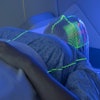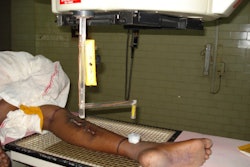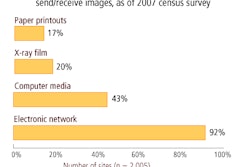It's great to be young, except when you're a breast cancer patient with a diagnosis of ductal carcinoma in situ (DCIS). Published research suggests that women under the age of 40 who are DCIS survivors have an increased risk of recurrent breast cancer, but a new study presented at the American Society for Therapeutic Radiology and Oncology (ASTRO) meeting begs to differ.
Results of a study following the outcomes of 440 breast cancer patients with DCIS who received treatment at Fox Chase Cancer Center in Philadelphia between 1978 and 2007 found no significant difference in the age of patients who had local recurrence. Patient outcomes were followed for as long as 24 years, with an average of 6.8 years, according to lead author and oncology fellow Dr. Aruna Turaka.
The objective of the study was to report and share the experience of Fox Chase Cancer Center patients relative to recent studies on women with DCIS. "There are discrepancies among past studies that looked at the outcomes of very young women with DCIS treated with radiation," Turaka said. "Many of these suggested a less favorable outcome than for older women. Because each of these studies reflects diverse factors, including how the cancer was managed by surgeons and radiation oncologists, we wanted to look at our own institution's experience in treating DCIS in this population."
The patient cohort did not include patients who had positive axillary lymph nodes or involvement in more than one area of the breast. Median age was 56.5 years; only 24 patients were 40 years of age or younger.
The DCIS lesions ranged in size from 1-50 mm, with a median size of 8 mm, and were mammographically detected in 86% of the patients. All of the patients had breast conservation surgery. Re-excision was performed in 62% of the total cohort, but 75% of the patients under age 40 had re-excision to obtain wider margins. All of the patients received whole-breast radiotherapy (median, 50 Gy), and 95% of patients also received a radiation boost at a median dose of 10 Gy.
Method of presentation, patient and DCIS characteristics, and surgical and adjuvant treatment were analyzed for their effects on local recurrence. There was absolutely no statistically significant difference in age with respect to local recurrence, according to Turaka. "Our study suggests that when treating DCIS with breast-conserving surgery and radiation, very young age plays a smaller role as a contributor to local recurrence than previously suggested."
|
|||||||||||||||
| The different recurrence rates shown above were not statistically significant. |
The researchers stated that a limitation of the study could be its overall small size and the fact that only 5.4% of the women in the cohort were age 40 or younger. They also said that the study's finding "could be related to the high utilization of surgical re-excision and a radiation boost as well as the careful patient selection."
By Cynthia Keen
AuntMinnie.com staff writer
October 1, 2008
Related Reading
Boost radiotherapy may help prevent relapse of DCIS in young women, July 6, 2006
In situ breast carcinomas raise risk of invasive cancers in certain women, April 12, 2006
Wide excision alone inadequate for preventing local DCIS recurrence, March 31, 2006
Copyright © 2008 AuntMinnie.com



















